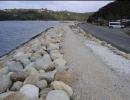 It was a happy experience to open the Waikato Times last week and see across from the editorial page the profile of scientist Jim Salinger under the headline Salinger doesn’t feel critics’ heat. The articlewas based on an interview with Salinger, who was visiting Hamilton to speak to Forest and Bird’s AGM about research on climate change since the 2007 IPCC report.
It was a happy experience to open the Waikato Times last week and see across from the editorial page the profile of scientist Jim Salinger under the headline Salinger doesn’t feel critics’ heat. The articlewas based on an interview with Salinger, who was visiting Hamilton to speak to Forest and Bird’s AGM about research on climate change since the 2007 IPCC report.
It opened with the recognition that in recent months Salinger has had to stave off repeated criticism of his work by the likes of Rodney Hide and the Climate Science Coalition. Even his decades-old PhD thesis has come under fire.
Salinger explains that when he did his thesis he simply wanted to work out what was happening with New Zealand climate.
“In those days we weren’t considering the greenhouse effect, and I thought ‘this is an interesting topic, see if New Zealand’s climate has changed’.”
He discovered the climate was warming slowly, and he’s confident that if Niwa rechecks his work using modern techniques they’ll come up with the same conclusions.
About the attacks, he chuckles slightly and says:
“Science is about facts, not beliefs. I like to look at the facts and see what they say – if people want to attack me as a person, that has nothing to do with my science. It doesn’t worry me.
“…This whole group are trying to accuse me, and my overseas scientific colleagues, of fraud.
“Well, there is going to have to be a hell of a lot of people involved in this “fraud’…They’re trying to say the International Panel on Climate Change is a fraudulent activity, and in fact it’s a very thorough process.”
The theft of the UEA emails he sees as a deliberate attempt to discredit the scientists and the science. After outlining the basics of the evidence of warming, and along the way defending the peer-review system, he summarises that his concern is whether the planet will be fit for survival by humans as a species.
I reflected when reading the article that it is sad that the mainstream science Salinger represents should have to be presented to Waikato Times readers as a response to the ignorant and despicable attacks mounted on New Zealand climate scientists by the ACT party and the Climate Science Coalition. The interviewing journalist Jeff Neems did a good job of ensuring that the science showed through clearly, but as a society we are apparently not yet ready to regard it as news enough in itself that leading scientists are greatly alarmed at what they are discovering about the effect of greenhouse gases on the climate. Had the Times not recently reported the attacks of Hide and company I imagine it is likely that Salinger would have slipped in and out of Hamilton virtually unnoticed except by those attending the Forest and Bird AGM.
I don’t mean to attack the Waikato Times particularly. It has a better record in these matters than many New Zealand papers. But the press as a whole should have been doing much more than it has in focusing public attention on the seriousness of the issue. The science Jim Salinger represents shouldn’t have to depend on the campaigning of Greenpeace to get media attention. He and others who work in the climate science field should be reported regularly and seriously. His wondering whether the planet will remain fit for human survival is not idle. It’s a serious science-based concern and the public should know that many leading scientists have such a level of concern. Hide and his companions strike at the foundations of intellectual regard on which the functioning of society depends. Our newspapers should be strengthening those foundations.

 This column was published in the Waikato Times on March 16.
This column was published in the Waikato Times on March 16.